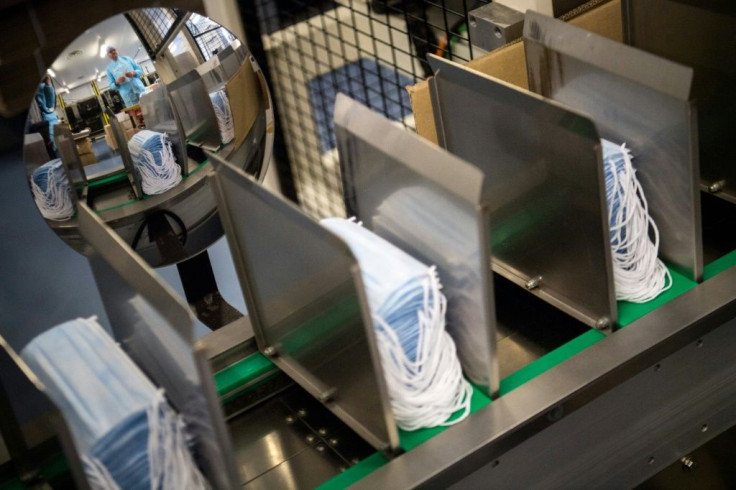Coronavirus Update: Nepal Prepares To Fly Citizens Home From China As Trade Ties Shut Down

KEY POINTS
- Nepal's trade ties with China has temporaril shut down
- Almost 200 Nepalis are stranded in Wuhan, China
- Nepal has confirmed at least one case of coronavirus in the country
Nearly 200 Nepalis in China will be returned home this week after pleading with their home country to repatriate them from coronavirus-wracked Wuhan in Hubei province.
The Embassy of Nepal in China had received at least 180 applications from Nepalis living in Wuhan and five other cities in Hubei, and other parts of China, to airlift them home.
“All of these applicants are students, except three who are children,” said Sushil Lamsal, deputy chief of mission at the embassy. “Those who have filed applications will be sent to Nepal on Wednesday evening via Wuhan Tianhe International Airport. A chartered Nepal Airlines Corporation aircraft will be used to airlift them.”
Lamsal added that at least 10 Nepalis working in China “have not shown interest in returning to Nepal.”
Lamsal noted that as more and more countries evacuate their citizens out of China, “the panic level among Nepalis living in Wuhan has heightened. But it is not easy to evacuate Nepalis immediately as we will first have to meet the Chinese safety requirements.”
The Kathmandu government has held discussions with Nepal Airlines Corp., or NAC, the national flag carrier, on bringing Nepalis back from China on Wednesday.
“But nothing has been finalized so far as we first need to prepare documents to get approval from the Chinese aviation authority to operate the flight,” said NAC spokesperson Archana Khadka.
Prior to evacuation, Nepalis will be required to undergo a medical evaluation in China. If they test positive for coronavirus, they will be barred from traveling to Nepal and will have to undergo treatment in China.
“As for those who have not contracted the disease, we will have to assure the Chinese government that they will be quarantined properly before they are sent home,” said Lamsal.
The Nepali government said it will quarantine returnees for two weeks before releasing them, however it has not yet selected a quarantine site for them.
“We don’t have proper equipment at the airport to quarantine returnees. Neither do we have medical facilities to isolate those suspected to have been infected with the disease,” Mahendra Shrestha, spokesperson for the Ministry of Health and Population, said late last week.
The Ministry has since proposed to quarantine the evacuees at Nepal Electricity Authority Training Center in Bhaktapur; the Agricultural Development Bank Central Training Institute in Bode, Bhaktapur; the Nepal Administrative Staff College in Jawlakhel, Lalitpur, or the National Ayurveda Research and Training Center in Kirtipur.
“But we have not finalized the location,” said Shrestha.
A Nepali student in Wuhan named Ashok tweeted last week: “We are panicking here.”
Gaurab Pokharel, a medical student in Wuhan, declared: “[Nepali students in Wuhan] are so angry that they have accused the Nepal government of doing nothing.”
Nepal has confirmed at least one case of coronavirus in the country – a student who returned home from Wuhan.
Meanwhile, the outbreak of the coronavirus has completely shut down Nepal-China trade.
Nepal has closed the border post at Rasuwagadi, a major trade point between the two nations in order to prevent spread of the virus.
“Hundreds of Nepal-bound containers have been stalled in parts of China following the closure of the entry point. Nepal-China trade is certain to be affected as China copes with the outbreak of coronavirus,” said Kamalesh Agrawal, vice-president of the Nepal Chamber of Commerce.
China is Nepal’s second biggest trading partner after India.
Bilateral trade volume between China and Nepal amounted to $900 million in the first eight months of 2019, up 38.7% over the prior year.
Nepal principally exports handicraft goods to China and imports garments, footwear products, chemical fertilizers, electrical goods, machinery parts, pipes, raw silk, telecommunication equipment and television equipment and parts from China.
Agrawal added that trade with China will resume only when the coronavirus outbreak is brought under control. Meanwhile, Nepal will surely face a shortage of Chinese goods and their prices will surge. “We hope the coronavirus outbreak is controlled soon and international trade with China becomes normal,” he said.
Nabaraj Dhakal, joint secretary at the Ministry of Industry, Commerce and Supplies, assured: “We’ll closely monitor the domestic market to ensure that prices of Chinese goods are not hiked arbitrarily.”
Meanwhile, Nepal has run out of face masks due to escalating demand, raising fears of people seeking to protect themselves from the virus.
Raisa Singh, a pharmacist at Prakash Pharmacia in Kathmandu, said that her business ran out of face masks a few days ago. “A lot of people come to ask for masks everyday but we do not have a single piece to sell,” said Singh. “A lot of Chinese tourists also come to ask for a mask.”
Nepal had imported 348,065 masks in the first six months of the current fiscal year, said the Department of Customs. Of that total, 194,820 were imported from China, 76,968 from the Philippines and 30,635 from India. India stopped exporting masks over the weekend.
But public health experts contend masks cannot protect people from the coronavirus.
“How can a mask save one from a contagious virus that has no cure or vaccine,” asked Dr. Sher Bahadur Pun, a virologist at the Sukraraj Tropical and Infectious Disease Hospital in Kathmandu. “There is no scientific proof that the virus will not bypass a face mask. The virus can be [transmitted] by several ways, including touching things that contain cough droplets from an infected person.”
© Copyright IBTimes 2025. All rights reserved.





















